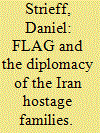| Srl | Item |
| 1 |
ID:
145538


|
|
|
|
|
| Summary/Abstract |
This article examines the domestic politics of President Jimmy Carter’s 1978 “package” sale of advanced warplanes to Egypt, Israel and Saudi Arabia. Based on newly available documents from the Carter Presidential Library, the Israel State Archives, private collections, and media and public opinion material, it argues that Carter was so eager to demonstrate he had the strength to overcome domestic opposition to pursue his international agenda that the means used to gain support for the package virtually eclipsed the end itself. The White House based its decision to pursue the sales on strategic imperatives. However, the tactics employed to push the package through Congress stemmed as much from Carter’s political imperatives as from the need to meet the Saudis’ request. The episode underscored the reflexive nature of Carter’s domestic political standing and his Arab-Israeli policy, with his position in one serving to reinforce the other.
|
|
|
|
|
|
|
|
|
|
|
|
|
|
|
|
| 2 |
ID:
157217


|
|
|
|
|
| Summary/Abstract |
The extraordinary public diplomacy carried out by the families of the American hostages held in Iran from 1979 -1981 domesticated and humanised the biggest foreign policy crisis of Jimmy Carter's presidency. The families, notably represented by the Family Liaison Action Group (FLAG), led an unprecedented campaign to raise awareness of the plight of their relatives. The families designed their efforts to garner public and media attention, and manage relations with the press. To that end, the news media emerge as a singularly influential domestic actor in this episode. Moreover, women constituted the vast majority of family members regularly cited in news coverage and occupied a sizeable leadership role within organised activities during the crisis. The centrality of the families helped harden American attitudes toward Iran: not merely an outgrowth of a diplomatic dispute, it represented a sort of personal violence toward individual Americans and their families.
|
|
|
|
|
|
|
|
|
|
|
|
|
|
|
|